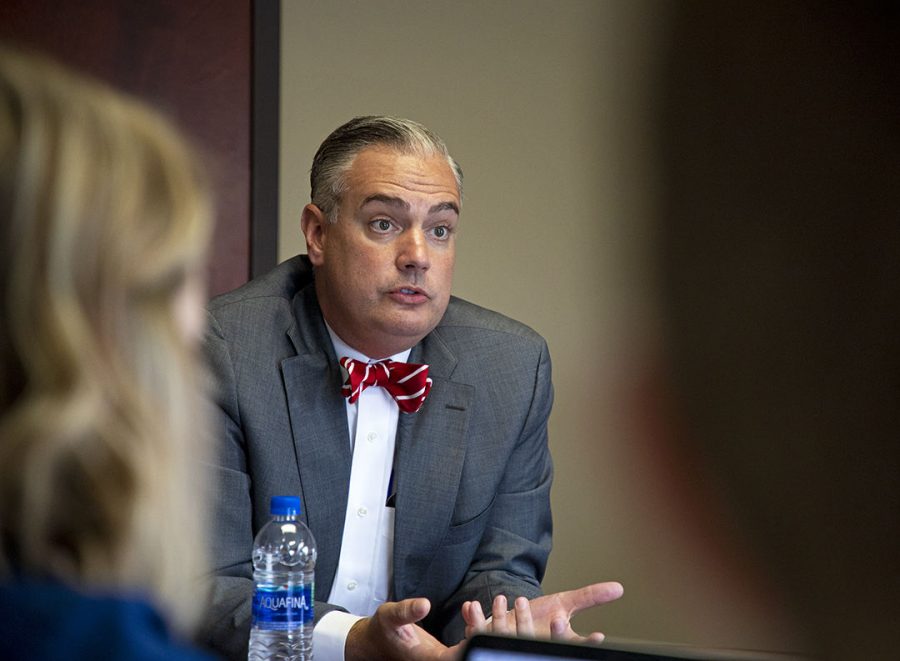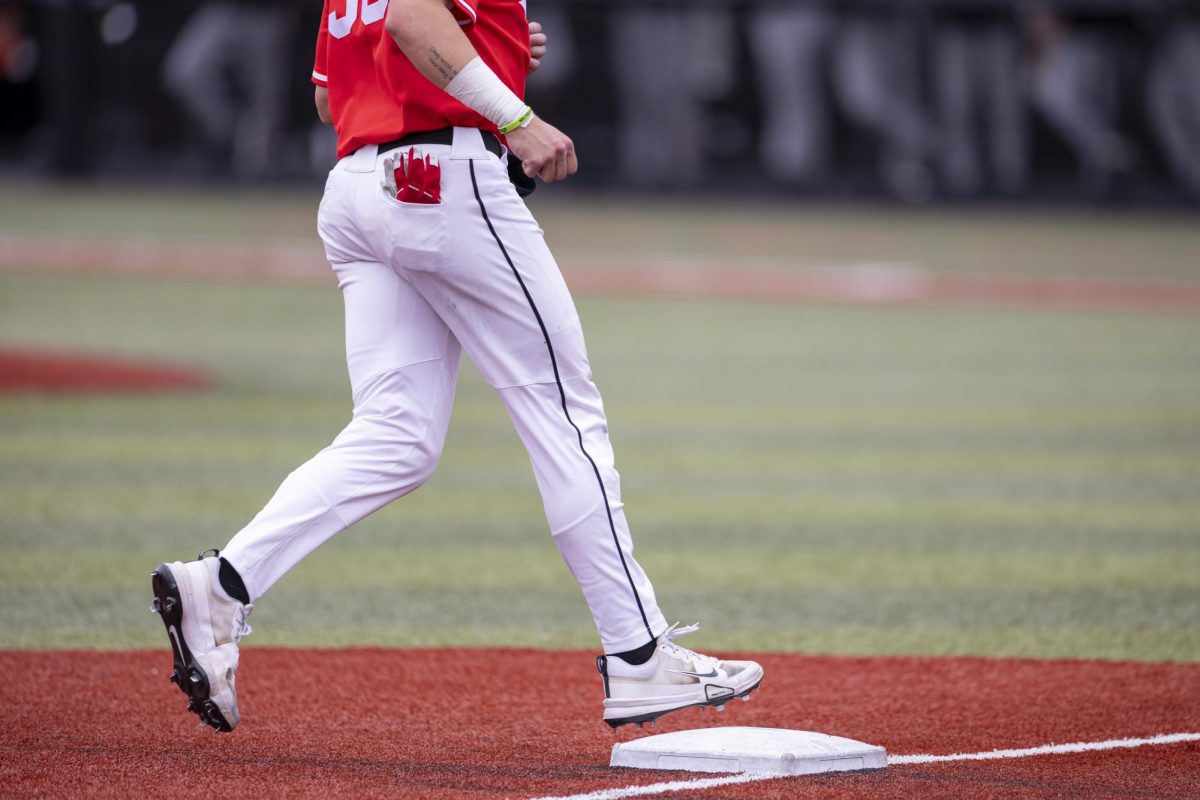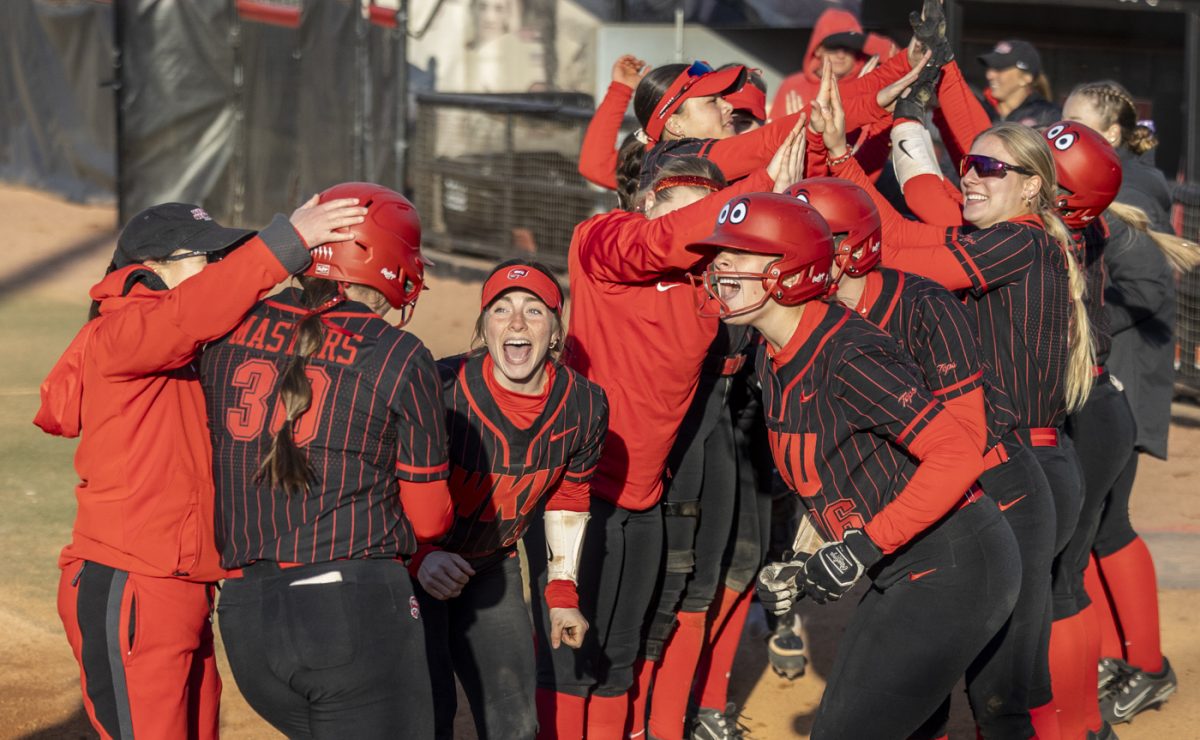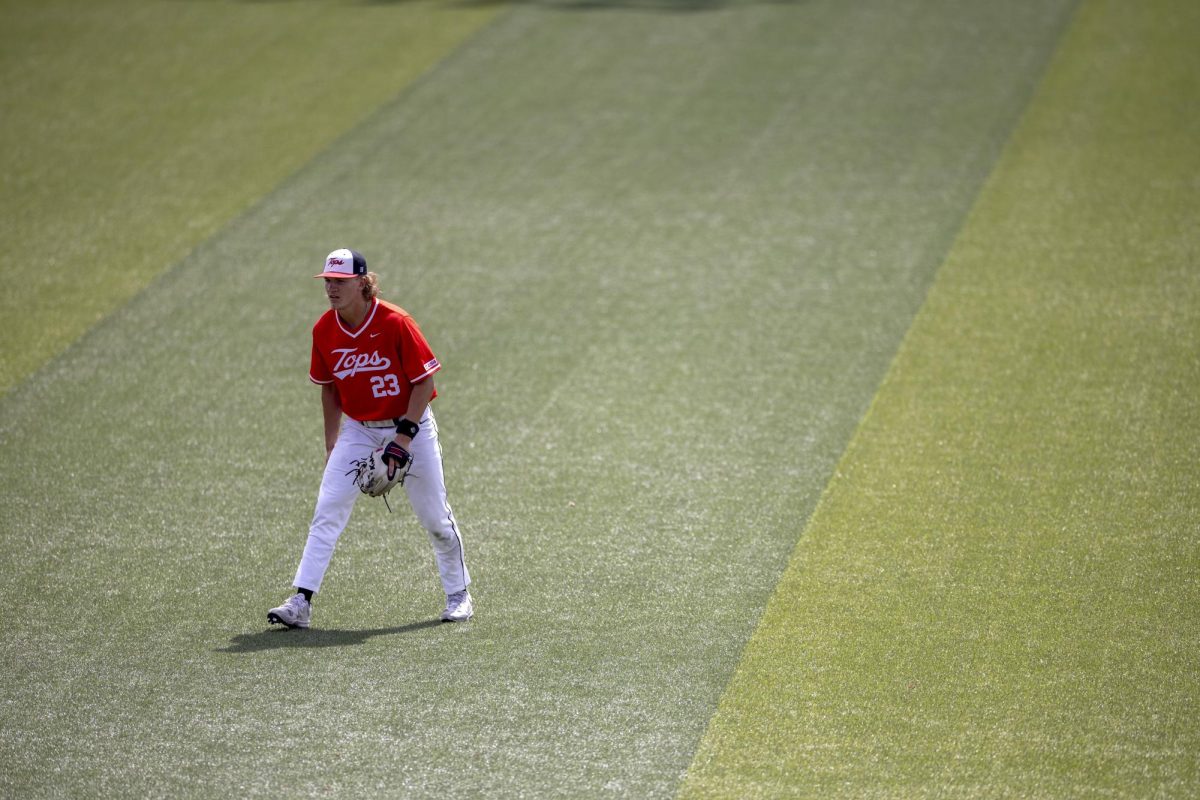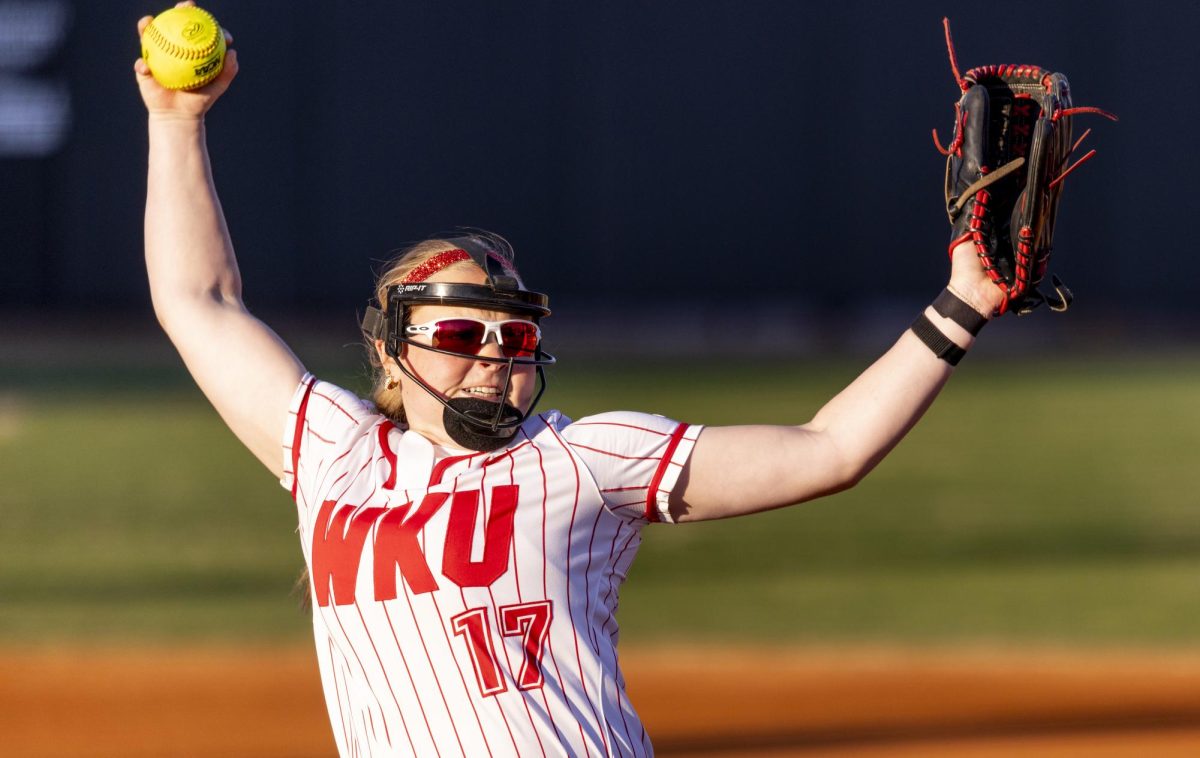6 takeaways from the Herald editorial board’s meeting with Caboni
August 24, 2018
Three days before the start of the Fall 2018 semester, President Timothy Caboni sat down with members of the College Heights Herald editorial board to talk about the upcoming school year and the state of the university following his first year as president.
Caboni discussed several significant issues and plans for the 2018-2019 academic year, and topics ranged from Cage the Elephant to campus construction, the Title IX process and of course, bow ties.
Here’s what the WKU community needs to know as a new semester begins.
Parking to be moved further from campus center during construction
Plans for a “first-year village” are to create a living and learning-style community for freshmen where Bemis-Lawrence and Barnes-Campbell residence halls currently stand. Caboni said he hopes the village will be completed by Fall 2020 and is pushing for construction to start this winter.
The project focuses on student success and persistence by surrounding first-year students with faculty and peer advisers of similar interests and passions.
New plans for campus layout include moving some parking to the edge of campus to create a “campus feel.”
Caboni said a lot has been done to point out open parking to students, citing a new feature on the iWKU app which shows available parking.
“I know every faculty, staff and student on this campus wants to park in front of their building,“ Caboni said. “We don’t have that kind of space nor should we.”
By utilizing parking lots in a different way, Caboni said they will be increasing efficiency, safety and a competitive advantage.
Program reviews should not result in faculty cuts
WKU will undergo a comprehensive program review this year, addressing the university’s major academic programs and their contributions to students.
Caboni said he does not foresee faculty cuts coming out of the review. Instead, programs and departments may restructure and possibly replace certain program offerings with others.
The reviews and resulting decisions will be made “as close to the academic program as possible,” Caboni said.
Reviews will be led by deans, department chairs and faculty, who will be asked to look at number of students enrolled and applying, graduation rates and the number of faculty in that area.
“It’s good for us to take stock of what we do,” Caboni said. “At the end of the day this is connected to our new budget model. These are decisions that we’re empowering our deans to make.”
Report from Title IX committee expected this fall
Following an April 24 story concerning the harassment former student body president Andi Dahmer said she received, Caboni publicly responded with the announcement of a review of the office of Equal Employment Opportunity, Title IX and the Office of Student Conduct.
The committee, led by assistant sociology professor Lauren McClain and assistant director of Counseling & Testing Karl Laves, has presented a draft of its investigation to Caboni who said he is now working on a response.
“We’re working back and forth on not just that draft but my response to it,” Caboni said. “My expectation is by early October we’ll have some announcements not just on Title IX but on other changes and recommendations they’ve made.”
The committee is comprised of a group of faculty and staff along with a student.
Dahmer filed a complaint with WKU’s Title IX Office but was told her case did not qualify as harassment, and her case went through the Office of Student Conduct. According to Caboni, the committee reviewed case files and worked with outside assistants to understand how the law and its implications work.
“I’m very thankful that these individuals, some of whom were not on the payroll in the summer, invested countless hours to be able to understand what is a complex and difficult issue for universities nationally,” Caboni said.
Athletics looks for more donations and private fundraising
WKU athletics was hit with a funding cut of over $1 million during budget cuts made earlier this year. Following that, Caboni said Friday that the university isn’t going to be able give athletics more funding than it does now.
“If you think about what really elevates athletics at an institution, we can do only so much with a student fee, particularly when we’ve had some enrollment challenges,” Caboni said. “But student fees and tuition — the university subsidizing athletics — only goes so far, and we’re about at our limit with much of that. As enrollment goes up, there will be more student fee revenue for athletics.”
The set funding for athletics in the 2018-19 budget is $22.6 million, making it the third-highest funded area in the university, behind academic affairs ($150.9 million) and chief facilities officer ($26.9 million). Caboni discussed the importance fundraising will play for athletics following a record-setting year for WKU fundraising, just as it will for other aspects of the university.
“Private giving — where individuals want to spend and invest their money — in athletics makes a difference, in student persistence makes a difference, for our forensic team makes a difference, for our band makes a difference,” Caboni said.
Caboni also acknowledged that head basketball coach Rick Stansbury had been making fundraising efforts recently, and said that the university is looking to make fundraising efforts to help compete with other athletic departments.
“One of the things we know competitive recruiters use against us is that we don’t fly on charters, and many of them do,” Caboni said. “And so the question was, to a small group of donors, who are very interested in continuing the success and elevation of that thing that we do, is ‘Would you be willing to help us charter our flights?’”
Caboni maintained that to him, athletics is important to the college experience at WKU.
“We want to make sure we have the total college experience here,” Caboni said. “That means the best theater, journalism, student newspaper, photojournalism, forensics, band, athletics programs, anything you can imagine we want to do. And if we don’t have it, we’ll create it with you.”
Lawsuit over records involving employee misconduct carries over into fourth straight semester
When classes begin Monday, WKU and the Herald will enter the fourth consecutive semester with an ongoing, active lawsuit between them. The university sued the Herald in February of 2017 to keep records involving employee misconduct private after Herald reporter Nicole Ares made a public records request for the documents.
The latest update in the case came in April when oral arguments from both sides were heard. In late June, the Herald received previously redacted financial information detailing how much money WKU has spent on the case.
On Friday, Caboni reiterated the university’s stance.
“We think the judge is going to rule in our favor in this matter,” Caboni said. “We look forward to hopefully a speedy or speedy-ish decision in the next several months.”
Caboni declined to elaborate on the university’s stance despite the release of records similar in nature by other universities since the lawsuit began.
“I remain steadfastly committed to not releasing records that would allow for any individual to be identified even with redaction.”
Significant salary raises for faculty and staff
At the faculty and staff convocation Friday morning, Caboni announced a salary increase for all faculty. He explained every faculty member would receive a base two percent salary increase and could earn up to four percent more based off merit, meaning salary increases will range from two to six percent.
Caboni said having a significant raise for faculty members has been a goal since his first faculty senate meeting last fall. During the meeting, he heard frustrations about minimal increases to salary in the past decade. Caboni made a promise to have a four percent raise pool despite budget shortfall and skepticism.
With the announcement Caboni said he hopes this accomplishment demonstrates what the university can accomplish together in difficult times.
“When we put our minds to it and when we work together, even in difficult situations we can accomplish the things we need to accomplish,” Caboni said. “I think it’s a good signal to our faculty and staff that they’re important, that we want to reward success.”
The first print edition of the College Heights Herald for the Fall 2018 semester will be available on Tuesday, Aug. 28.

